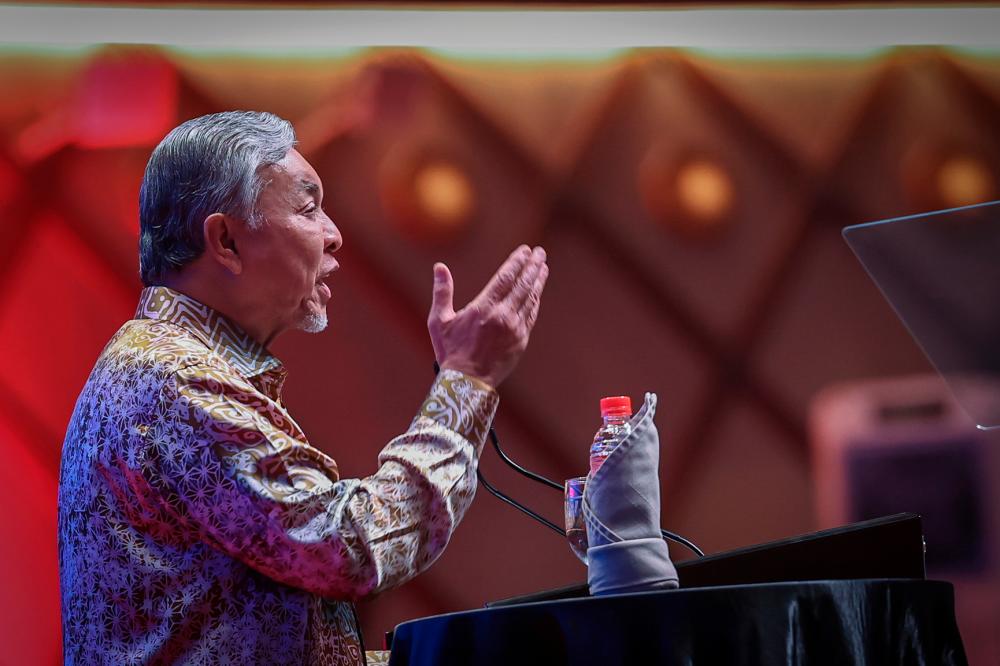PUTRAJAYA: The proposal to establish a Bumiputera Land Corporation is among the three initiatives designed to empower the Bumiputera community and support the Bumiputera Economic Transformation (TEB), said Deputy Prime Minister Datuk Seri Dr Ahmad Zahid Hamidi.
He said the proposed corporation is intended to safeguard Bumiputera land ownership, which serves as the foundation for economic stability and the preservation of national identity.
Ahmad Zahid said that the corporation’s responsibility is to formulate mechanisms to enhance and leverage Bumiputera land ownership in the future.
“It is recommended that all land in agricultural areas with leases exceeding 50 acres or industrial plots exceeding 20 acres, upon lease expiry and extension request, 20 per cent of the land should be returned to the government and managed by this corporation,” he said.
ALSO READ: DPM Ahmad Zahid proposes Bumiputera Economic Transformation
Ahmad Zahid, who is also the Rural and Regional Development Minister, said this in his keynote address at the Bumiputera Economic Congress 2024 (KEB 2024) at the Putrajaya International Convention Centre (PICC) here today.
Ahmad Zahid also said that the establishment of the Bumiputera Land Corporation was a proactive step aimed at ensuring the racial demographic balance; creating the survival of Bumiputera business areas for agricultural, industrial and new settlement purposes; and strengthening efforts to maintain Bumiputera ownership.
“I believe that this initiative can provide greater returns and opportunities for Bumiputera to own a share of the nation’s land assets,” he said.
He pointed out that through careful and strategic planning, each business area is expected to provide substantial benefits to the Bumiputera community, while ensuring continuous economic sustainability.
Ahmad Zahid also stressed the need for a Health Waqaf and Didik Bumiputera (SIDIK) plan to guarantee the continuous provision of healthcare and educational services for the Bumiputera community.
According to him, SIDIK will provide facilities, equipment, and healthcare services, such as haemodialysis centres and machines, healthcare services for the elderly, and financing for chronic disease treatment.
In addition, SIDIK seeks to empower Bumiputera educational institutions and training centres, provide scholarships for Bumiputera children and empower skills development programmes to increase the Bumiputera workforce’s marketability.
“This is also an effort to address the challenges posed by rising healthcare and education costs for various groups, such as the asnaf, the elderly, and other affected target groups,” he said.
Ahmad Zahid also proposed the establishment of a contribution system involving government-linked companies (GLCs), government-linked investment companies (GLICs), foundation trusts, and individuals to enhance the well-being of Bumiputera.
The Deputy Prime Minister said the third recommended initiative is the industrialisation of agriculture, with the aim of integrating Bumiputera into the large-scale food crop farming sector and ensuring the country’s food resource production.
Citing the achievements of Felda and Felcra in spearheading the development of commodity crop agriculture, he highlighted that their success has propelled the country to become one of the world’s top exporters of palm oil and rubber.
Acknowledging that some members of the Bumiputera community have limited land resources, Ahmad Zahid proposed the establishment of an entity to address the issue.
He said the entity would be responsible for funding and developing Bumiputera-owned lands or those owned by groups of Bumiputeras, which have the potential for cultivating food crops.
“Through this initiative, we also need to use new technology and innovation to boost crop yields. Certainly, the adoption of modern agricultural technology requires high costs and funding to ensure its success,” he said.
Ahmad Zahid said that by establishing the entity with a specific focus on this sector, funding initiatives, research, and innovation can be done systematically to increase revenue.
He said that large-scale crop production, coupled with technological advancements enables the production of various downstream agricultural products, which not only add value but can also be commercially marketed, bringing multiple profits.
“Through the same approach, in the next few years, the production of agricultural food products in the country will be able to meet domestic needs in line with food security efforts,” he said. - Bernama









